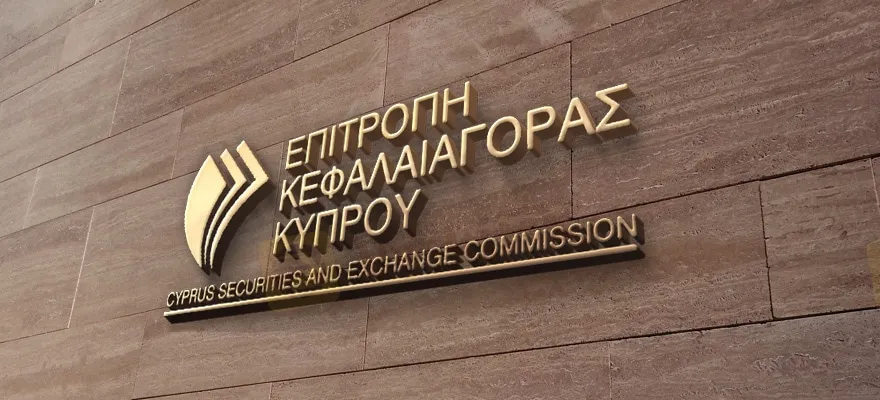简体中文
繁體中文
English
Pусский
日本語
ภาษาไทย
Tiếng Việt
Bahasa Indonesia
Español
हिन्दी
Filippiiniläinen
Français
Deutsch
Português
Türkçe
한국어
العربية
WikiFX report: CySEC Withdraws ICF Membership of Coverdeal Holdings
Abstract:The company terminated its services last year, and its CIF license was also withdrawn.

The Cyprus Securities and Exchange Commission (CySEC) announced on Tuesday that Coverdeal Holdings Ltd., which terminated services last year, is no longer a member of the Investors Compensation Fund (ICF).
The Cypriot regulator offers up to 20,000 euros protection to the deposits of all traders under any locally regulated financial services company. This ensures the safety of client deposits in case of the broker going bankrupt.
“The loss of ICF membership status does not mean loss of rights of covered clients to receive compensation in relation to investment operations carried out until the loss of membership status if the conditions for compensation are fulfilled pursuant to the Directive, nor does it obstruct the initiation of the compensation procedure for covered clients,” CySEC stated.
An Exodus of Cypriot Brokers?
The withdrawal of the ICF membership came as the out-of-business broker, Coverdeal renounced its Cyprus Investment Fund (CIF) license last year, and the regulator withdrew it in February 2021.
Coverdeal offered investment and ancillary services and operated multiple CySEC-regulated platforms. According to the CySEC manifest, the company did not face any regulatory action but was slapped with a €250,000 penalty for compliance violations in 2018.
Coverdeal closed its business last year and urged traders to close or liquidate all open positions and withdraw funds. Furthermore, it notified the clients that it transferred funds of those who did not withdraw their balances to the investors compensation fund.
Lately, many brokers left CySEC, but most of them were under the regulatory radar for some kind of violations. Last month, the Cypriot watchdog removed the ICF membership of Bogofinance Capital Markets, which operated retail Forex broker brand FXJet, after a similar withdrawal of the CIF license.
Disclaimer:
The views in this article only represent the author's personal views, and do not constitute investment advice on this platform. This platform does not guarantee the accuracy, completeness and timeliness of the information in the article, and will not be liable for any loss caused by the use of or reliance on the information in the article.
Read more

The Hidden Checklist: Five Unconventional Steps to Vet Your Broker
Forex broker scams continue to evolve, employing new tactics to appear credible and mislead unsuspecting traders. Identifying these fraudulent schemes requires vigilance and strategies beyond the usual advice. Here are five effective methods to help traders assess the legitimacy of a forex broker and avoid potential pitfalls.

Doo Financial Obtains Licenses in BVI and Cayman Islands
Doo Financial, a subsidiary of Singapore-based Doo Group, has expanded its regulatory footprint by securing new offshore licenses from the British Virgin Islands Financial Services Commission (BVI FSC) and the Cayman Islands Monetary Authority (CIMA).

CFI’s New Initiative Aims to Promote Transparency in Trading
A new programme has been launched by CFI to address the growing need for transparency and awareness in online trading. Named “Trading Transparency+: Empowering Awareness and Clarity in Trading,” the initiative seeks to combat misinformation and equip individuals with resources to evaluate whether trading aligns with their financial goals and circumstances.

Malaysian-Thai Fraud Syndicate Dismantled, Millions in Losses Reported
The Royal Malaysia Police (PDRM) has received 26 reports concerning the Nicshare and CommonApps investment schemes, both linked to a major fraudulent syndicate led by a Malaysian citizen. The syndicate’s activities came to light following the arrest of its leader by Thai authorities on 16 December.
WikiFX Broker
Latest News
ASIC Sues Binance Australia Derivatives for Misclassifying Retail Clients
WikiFX Review: Is FxPro Reliable?
Malaysian-Thai Fraud Syndicate Dismantled, Millions in Losses Reported
Trading frauds topped the list of scams in India- Report Reveals
AIMS Broker Review
The Hidden Checklist: Five Unconventional Steps to Vet Your Broker
YAMARKETS' Jingle Bells Christmas Offer!
Revolut Leads UK Neobanks in the Digital Banking Revolution
Fusion Markets: Safe Choice or Scam to Avoid?
SEC Approves Hashdex and Franklin Crypto ETFs on Nasdaq
Currency Calculator


